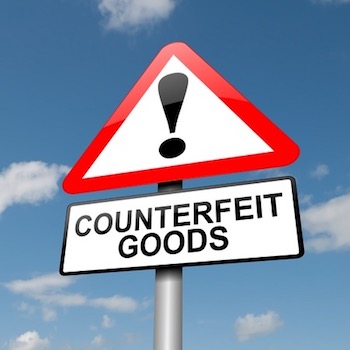“If webpages are engaged in illegal activity, including counterfeiting, a search engine should work with the brand owner to deindex the webpage from its search results.” – INTA
 Yesterday was World Anti-Counterfeiting Day (though there’s not much available online to prove it). Of course, counterfeits have proliferated over the last year, as people stayed home and shopped online more than ever before. A January 2021 report by Digital Commerce 360 found that U.S. ecommerce sales grew by 44% last year over 2019—” the highest annual U.S. ecommerce growth in at least two decades.” As part of a report released yesterday on how to address the sale of counterfeits online, the International Trademark Association (INTA) said that—even in more normal times—a 2020 Department of Homeland Security report found that “e-commerce year-over-year retail sales grew by 13.3 percent in the second quarter of 2019 while total retail sales increased by only 3.2 percent as brick-and-mortar retail continued its relative decline.”
Yesterday was World Anti-Counterfeiting Day (though there’s not much available online to prove it). Of course, counterfeits have proliferated over the last year, as people stayed home and shopped online more than ever before. A January 2021 report by Digital Commerce 360 found that U.S. ecommerce sales grew by 44% last year over 2019—” the highest annual U.S. ecommerce growth in at least two decades.” As part of a report released yesterday on how to address the sale of counterfeits online, the International Trademark Association (INTA) said that—even in more normal times—a 2020 Department of Homeland Security report found that “e-commerce year-over-year retail sales grew by 13.3 percent in the second quarter of 2019 while total retail sales increased by only 3.2 percent as brick-and-mortar retail continued its relative decline.”
To help combat the attendant proliferation of counterfeits that comes with this kind of growth, INTA’s report provides updated best practices for brand owners, marketplaces and other relevant stakeholders to combat counterfeits online.
While the report puts the onus on all stakeholders to tackle the problem, it calls out search engines up front:
Technology companies running search engines can do quite a bit to assist brand owners in the fight against counterfeits. For instance, if webpages are engaged in illegal activity, including counterfeiting, a search engine should work with the brand owner to deindex the webpage from its search results.
Among some of the “stronger” recommendations the guide makes is that social media sites should enact “filtering programs” that would remove “postings that advertise the sale of counterfeit merchandise in publicly available pages or groups.” The guide also says that “search engines should implement removals as informed by brand owner feedback [and] online marketplaces should employ mechanisms to facilitate the takedown of counterfeit goods, including click-through notices, online help pages, email communication, online chat, filters, and/or other communications.”
The Association also recently approved two anticounterfeiting-focused resolutions: (1) Proceeds of Counterfeiting and (2) Remarking as Criminal Counterfeiting.
The resolutions call on countries to empower courts and law enforcement agencies to take stronger actions on anticounterfeiting enforcement. Suggestions include “innovative legal frameworks dealing with the seizure and adequate disposal and transfer of confiscated goods and instituting criminal sanctions when genuine products are modified without a brand owner’s authorization.”
INTA suggested in a press release that consumers shop only from authorized retail distributors both online and in stores, “look for verifiable contact details and real-time customer service for online retailers, and be wary of prices that ‘seem too good to be true.’”
The UK-based Anti-Counterfeiting Group (ACG) said in a message to consumers yesterday that organized crime has benefited most during the pandemic and that the ACG “has never been busier”:
Intelligence streamed in about fake producers and sellers using the internet to peddle their shoddy and dangerous products, while they manufactured and stockpiled even more, in readiness for restrictions to be lifted. With billions falling out of the economy in support of universities, local authorities, the NHS and the Job Retention Scheme, huge amounts were also being syphoned into criminal hands, because of accelerating the shift towards internet buying, with consumers being duped into buying fakes.
The message added that around 60% of consumers say that they will continue to buy as much online after the pandemic as they did during, and criminal organizations realize this. “If you want to help rebuild our economy and safeguard your families don’t buy into organised crime, it will only bring long-term harm and misery.”
Image rights acquired by 123RF.com

![[IPWatchdog Logo]](https://ipwatchdog.com/wp-content/themes/IPWatchdog%20-%202023/assets/images/temp/logo-small@2x.png)

![[[Advertisement]]](https://ipwatchdog.com/wp-content/uploads/2024/04/Patent-Litigation-2024-banner-938x313-1.jpeg)
![[Advertisement]](https://ipwatchdog.com/wp-content/uploads/2024/04/UnitedLex-May-2-2024-sidebar-700x500-1.jpg)
![[Advertisement]](https://ipwatchdog.com/wp-content/uploads/2024/04/Artificial-Intelligence-2024-REPLAY-sidebar-700x500-corrected.jpg)
![[Advertisement]](https://ipwatchdog.com/wp-content/uploads/2024/04/Patent-Litigation-Masters-2024-sidebar-700x500-1.jpg)

![[Advertisement]](https://ipwatchdog.com/wp-content/uploads/2021/12/WEBINAR-336-x-280-px.png)
![[Advertisement]](https://ipwatchdog.com/wp-content/uploads/2021/12/2021-Patent-Practice-on-Demand-recorded-Feb-2021-336-x-280.jpg)
![[Advertisement]](https://ipwatchdog.com/wp-content/uploads/2021/12/Ad-4-The-Invent-Patent-System™.png)






Join the Discussion
No comments yet.